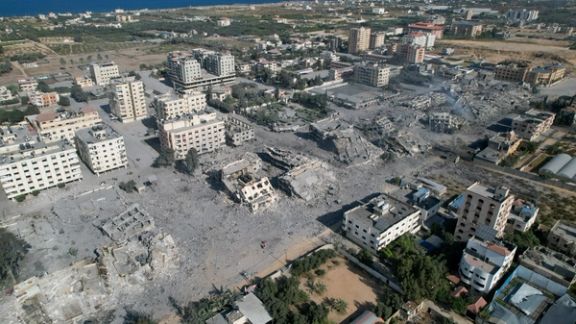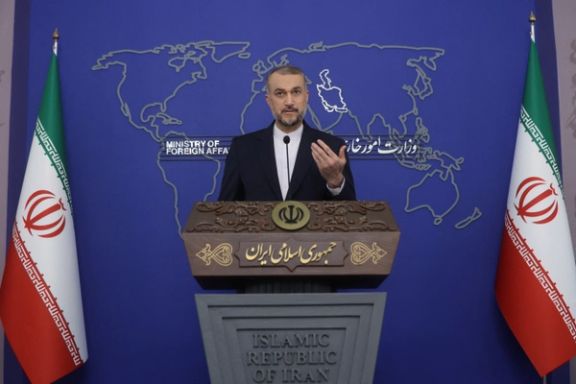Iran Talks Tough But Stays Cautious In Gaza Conflict

Iran continues to issue fiery statements, threatening escalation in the Gaza war, yet have not taken any concrete steps on the ground to underpin their claims.

Iran continues to issue fiery statements, threatening escalation in the Gaza war, yet have not taken any concrete steps on the ground to underpin their claims.
Israel began a ground offensive into Gaza Friday night, first launching devastating air strikes. Defense Minister Yoav Gallant stated that the war against Hamas has entered a new phase, signaling the potential onset of the ground offensive.
Iran's Foreign Minister Hossein Amir-Abdollahian issued a warning regarding the United States' support for Israel during his visit to New York to attend a special session of the United Nations General Assembly. In an interview with Bloomberg Television from Iran's mission to the UN in New York, he warned, "The US is advising others to show self-restraint, but it has sided with Israel totally."
Amir-Abdollahian had set a very strict red line on October 15 regarding the Gaza ground offensive, warning that this would spiral the conflict and mutate into a regional war.
“If the Zionist entity [Israel] decides to enter Gaza, the resistance leaders will turn it into a graveyard of the occupation soldiers,” Hossein Amir-Abdollahian had told Al Jazeera.
A similar view was expressed by the IRGC Commander-In-Chief Major General Hossein Salami, who said that the Israeli army was not able to combat Hamas, stating: "The ground is the strength of Hamas, and if Hamas fights on the ground, Israelis will be swallowed up, and Gaza will serve as their burial ground."

Meanwhile, the Gaza Strip continues to be bombarded by Israel's air force following an intensified attack last night that caused communication networks to go down. The Israel Defense Forces has announced the death of a senior leader behind the October 7 attack.
IDF has also issued a call for Gaza residents to evacuate prior to a wider operation in the north of the territory, saying that "the impending operation is set to neutralize the threat of Hamas with precision and intensity."
Iranian authorities had warned Israel that “unification of the fronts” would happen in case of a ground attack. Meaning that the so called “resistance front”, the alliance of Tehran’s proxy militias in the region would join forces against Israel.
Nonetheless, so far, the largest of those proxies, the Lebanese Hezbollah, has maintained a relatively low level of activity, causing Hamas officials to publicly voice their discontent.
On the surface it appears that Iran is taking a different approach, as Salman Zakir, member of Iran’s parliament for Urmia, called for a diplomatic solution rather than a military one to deal with the crisis in Gaza.
Iranian President's call with Qatar's Emir on Saturday is another indication of this strategy. In recent years, Iran and its proxies have relied heavily on Qatar as a mediator to negotiate with Western governments. The Qatari government has also been successful recently in negotiating the release of hostages on behalf of Hamas, which maintains its headquarters in Doha.
It appears that the metaphor analysts used to explain Israel's strategy against militants in the Gaza Strip, "mowing the grass," has ceased to be relevant since more than 1,400 civilians and hundreds of soldiers have been slaughtered by Hamas terrorists after the group's surprise attack on Israel.
It is possible that Israel has abandoned the use of patient deterrence in the region and is determined to actively eliminate militants. Consequently, they may not adhere to the principle of proportionate retaliation against Hezbollah. In an interview with Iran International, the Israeli UN ambassador Gilad Erdan had said: “The Ayatollah regime is the head of the octopus and Hamas is only one of its tentacles. Once we’re finished with this war, we will address this global threat that Iran poses."
In Washington's recent swift retaliation strike against Iran-linked sites in Syria following assaults on US CENTCOM forces in Syria and Iraq, Iran did not benefit from the usual tactic of no retaliation. Clearly, the United States supports Israel completely, and a full-scale war may not be in the best interest of Iran. Moreover, the regime's usual diversionary tactic may be ineffective in this case, at least at this point.